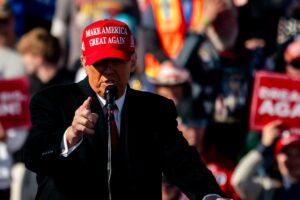NEW YORK, Aug 25 (Reuters) – The U.S. dollar held steady on Friday, on pace to finish the week strong, after Federal Reserve Chair Jerome Powell said the central bank may need to raise interest rates further to ensure inflation is contained, but promised to move “carefully” at upcoming meetings.
Powell, in a speech at an economic summit in Jackson Hole, Wyoming, said policymakers would “proceed carefully as we decide whether to tighten further,” but also made clear that the central bank has not yet concluded that its benchmark interest rate is high enough to be sure that inflation returns to the 2% target.
The U.S. dollar index – which measures the currency against six major counterparts – was about flat at $104.06 after rising to 104.44, its highest since June 1.
The index, up 0.6% for the week, was on course for its sixth straight week of gains, aided by signs of resilience in the U.S. economy that has bolstered the case for rates staying higher for longer.
“On balance, this is a modestly less hawkish speech than markets had feared,” said Karl Schamotta, chief market strategist at Corpay in Toronto.
“Powell’s words lacked the drama associated with previous speeches from (Former Fed Chair Ben) Bernanke and (former European Central Bank President Mario) Draghi, and even fell short of the directness found in his own appearances, but we would argue this is a good thing – conditions remain too uncertain for black-and-white messaging, and markets should welcome a more gradualist and incremental approach at this point in the tightening cycle,” Schamotta said.
Interest rate futures tied to the Fed’s policy rate on Friday priced in a more than even chance of tightening at either the November or December policy meetings.
“We remain comfortable with our call for one more 25 bp hike in November and 75 bp of cuts next year, starting in June and proceeding at a quarterly cadence,” BofA Global Research strategists said in a note.
Both the euro and sterling have been hit this week by weak business activity data that has prompted investors to scale back bets on further rate hikes in the euro area and Britain.
The common currency has come under pressure as ECB policymakers are increasingly worried about weakening growth prospects and, while the debate is still open, momentum for a pause in its interest rate increases is building, Reuters reported, citing eight sources with direct knowledge of the discussion.
The mood among German businesses deteriorated more than expected in August, data showed, falling for the fourth month in a row and adding to fears that the economy may be heading for its second recession inside a year.
On Friday, the euro was 0.01% lower against the dollar at $1.08085.
The yen remained under pressure as traders watched for any signs the Japanese government was ready to intervene to prop up the currency, as it did last year.
Against the yen , the dollar was up 0.31% to 146.28.
The British pound dropped to a 10-week low on Friday as investors reined in expectations of where they think the Bank of England’s interest rate might peak after recent soft activity data. The pound was 0.03% lower at $1.2597, its lowest since June 13.
In cryptocurrencies, bitcoin fell 0.49% to $26,039, a three-day low.
Reporting by Saqib Iqbal Ahmed; additional reporting by Dhara Ranasinghe in London and Ankur Banerjee in Singapore; Editing by Kirsten Donovan, Christina Fincher, Nick Zieminski and Jonathan Oatis
Source: Reuters















